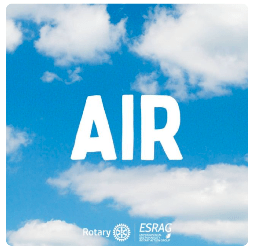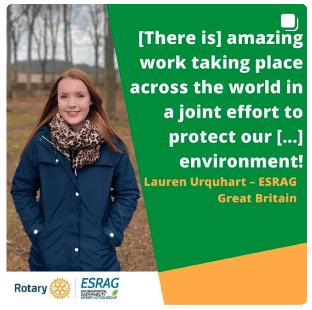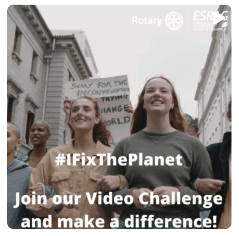RESOURCES
The Earthshot Prize
ESRAG is an official nominator for the Earthshot Prize.
THE EARTHSHOT PRIZE
How it works?
The Earthshot Prize was launched by Prince William and The Royal Foundation in October 2020 to discover and help grow innovative solutions to repair and regenerate the planet. Fifteen finalists receive a year’s fellowship and support to accelerate their ideas and find new funding and partnerships so they can scale their innovations to reach their full potential. Each year, for ten years, winners in five categories each receive a £1million Earthshot Prize. That’s £50million for 50 initiatives to save our planet.
Earthshot has many partners in different fields and expertise in a wide number of roles across the globe.
Urgency + Optimism = Action
Inspired by President John F. Kennedy’s “Moonshot” challenge in 1962 to land a man on the moon within a decade, The Earthshot Prize was launched by Prince William in 2020 to search for and scale the most innovative solutions to the world’s greatest environmental challenges.
Change is not yet happening fast enough or at the scale we need. Levels of climate anxiety and despondency are high and political interventions are happening too slowly.
Despite all these challenges, we are optimists. We see genuine pathways to an era of regeneration and abundance.
We want to unleash the urgent optimism required to accelerate and scale the environmental innovations that will repair and regenerate our planet.
“The Earthshot Prize exists to discover, spotlight and help grow innovative solutions that are working to repair and regenerate our planet.” – earthshotprize.org
Each year, The Earthshot Prize searches the globe for game-changing solutions to their Earthshots.
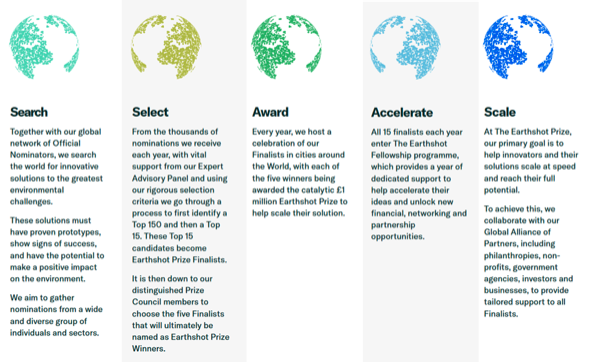
This search is guided by their Roadmap, an extensive plan informed by expert advisors and the latest scientific understanding. It outlines the criteria they believe is needed to uncover solutions with the greatest potential for positive impact.
Earthshot Prize Criteria
To repair our planet, we know that change needs to happen quickly and at scale. Finding and growing the solutions that will have transformative impacts is central to our mission.
Regenerating and repairing the planet while creating equitable and sustainable livelihoods is the largest transformation that our civilisation might ever go through. It requires system changes touching every level of society – political, economic, financial, cultural, legal. The Earthshot Prize selection criteria and priorities are their transparent roadmap to trying to make a difference in this decisive decade. Here is what they are looking for.
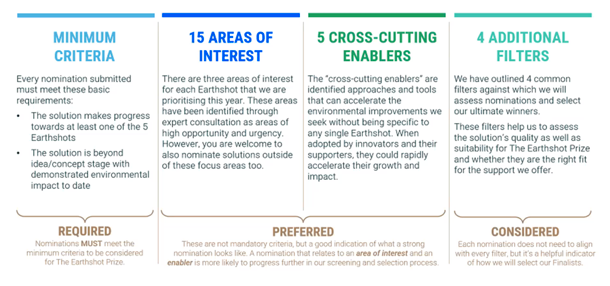
Nominations that are a good fit for the Earthshot prize should fit well within at least one of the 15 priority areas or should represent an outstanding wildcard.
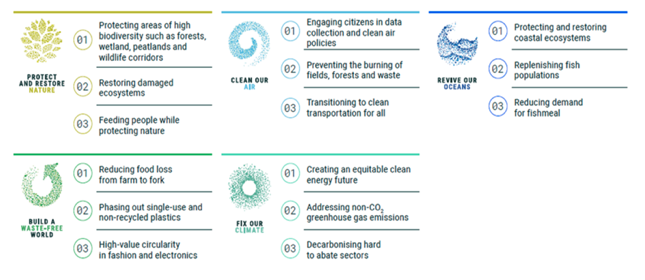
Earthshot reviewed the scientific literature and had conversations with experts. They identified approaches and tools that can accelerate the environmental improvements they seek without being specific to any single Earthshot.
Accelerating the Mission
These are the cross-cutting enablers, and when adopted by innovators and their supporters, they could rapidly accelerate the mission to achieve the Earthshots.
They are focused on
- Use of technology, AI or Data to enable transformation
- Nature and carbon markets, novel financial mechanisms and essential legal solutions
- Those informed by indigenous and local communities
- Promotion of shared economic opportunity
- Enabling policy change – working with governments, organisations and companies
The Four Filters
- FILTER 01 – Potential for global impact
Finalists will have the potential to be relevant on a global level by 2030.
They must clearly articulate their impact to date, and their potential to make a difference in the future based on one or more of our shortlisted environmental and social metrics.
- FILTER 02 – Diversity of solution types
Solutions are accepted from any country or sector in the world. It is through a diversity of solutions that new opportunities or connections are identified.
Nominees could be a not-for-profit or for-profit organisation, a local or national Government, a partnership, or a team. A particular emphasis is placed on geographic representation, gender, and indigenous representation and Earthshot actively source innovations from these communities.
- FILTER 03 – Stage of solution
Finalists will have solutions that can be scaled or replicated quickly through financial, communications or organisational support.
Solutions will be well developed beyond the idea stage.
They will have made significant progress with their solution and need support to be scaled beyond financial support alone.
- FILTER 04 – Organisational foundations
Finalists will encounter many opportunities to scale their solution and inspire replication through the Earthshot Prize so solutions are sought that are mature enough to maximise the support they receive.
This is judged based on the foundations they already have in place. Accounting for the quality of the leadership team, their commitment to inclusion and their organisational maturity.
FAQs
What are the criteria for making a nomination to The Earthshot Prize?
We will be reviewing all submitted solutions against the criteria provided to us by The Earthshot Prize. You can find out more about the criteria in this document.
Can ESRAG nominate a solution which is in an early idea or ideation phase?
No, the nominated solution must make an evidence-based contribution to the Earthshot(s) and have a clear proof of concept. The Earthshot Prize will not accept Nominees that are in the early-idea or ideation phase.
Will the nominations submitted be made public?
No, submitted Nomination Forms are confidential so ESRAG will not talk publicly about our nominations until after the Awards ceremony in the respective year. We will however contact the people/organisations who we choose to nominate directly to ensure they are happy for us to nominate them before putting them forward. We may issue a list of projects we have nominated and provide a summary and weblink.
Will I know if ESRAG has nominated me or my organisation?
Yes, we will maintain contact with you to confirm that you are happy to be nominated but ask that you will keep this information confidential. The official deadline for The Earthshot Prize to receive nominations from Nominators is set each year by The Earthshot Prize. However, we will close our call for solutions prior to that so that we can review the solutions we receive and submit them to The Earthshot Prize by the deadline date.
Can ESRAG nominate one solution in multiple Earthshot categories?
Yes, Nominators can submit a Nominated Solution for consideration in one, multiple or all five Earthshot categories. The Earthshot Prize organisers recognise there are existing solutions that can apply to multiple Earthshot challenge statements, so it is not a requirement for a proposed solution to be directly based on one Earthshot.
2025 ESRAG Earthshot Prize submitted nominations
ESRAG nominated 16 projects for the 2025 Earthshot Prize.
Actosol® Carbon Farming – ARCTECH Inc.
Enhances photosynthesis by plants, increasing roots 2 to 4 times by capturing more carbon dioxide from the air, forming humus-rich organic matter for durable storage in soils.
It enhances microbial activity in soils, converts the crop residue and roots to form humus-rich organic matter for durable storage in soils. It also increases crop yields by over 20% and replenishes depleted vital organic matter in soils. Soils are the 4th largest storehouse of carbon after sedimentary rocks, fossil fuels, oceans.
Since mid-18th century industrial age, increasing loss of carbon from soils is as much putting us and our planet at peril as increasing in air. Reconfiguring these two storehouses is amongst the easiest and quickest solution for speeding up capturing from the air.
In India, Actosol used on 10,000 farms and carbon farming on fruit tree farms resulted in increased organic matter by 0.5%. There is also proven use in the USA, China and the Middle East.
EGERLOO – Egerton University
EGERLOO address the problem of sanitation in water stressed urban areas. It replaces the pit latrine, resolves the problem of smell and vermin breeding, eliminates human-waste contact on site and hence the possibility of communicable diseases and resolves issues around the collapse of pit latrines.
The problem of unsafe sanitation affects approximately 3.5 billion people in the world mostly concentrated in urban areas. Even in areas with pit latrines, problems arise in instances of flooding where the entire contents of the pit latrines get mixed with flood water.
The design of EGERLOO allows it to be either above or below ground. The problem of sanitation arises from poor resource mobilization, poor planning, poor design, water scarcity and poverty among others. Drowning of children in pit latrines in South Africa in the recent past highlights how problematic open pit latrines can be.
EGERLOO is the best among competing solutions because it solves multiple problems at the same time. It solves the water sanitation equation by removing water from the equation, It solves the problem of digging pit latrines by providing only short-term storage, making the biggest EGERLOO to be 1.5m deep with an effective storage depth of 1.2m.
The pan design allows for sit on and squat configurations. It allows for centralized treatment of the waste allowing for resource recovery and re-use.
Food for ALL – Center for Sustainable Agricultural Excellence and Conservation
Food for All is a groundbreaking initiative addressing climate change, food insecurity, and resource conservation through innovative, closed-loop farming systems. By integrating ancient physics principles with modern technology, the solution combines recirculating agriculture systems (RAgS) with regenerative agriculture to create a waste-free, high-yield farming model.
These systems reduce water usage by up to 90%, eliminate agricultural runoff, and repair degraded soils using phosphate accumulators and nutrient recycling. Within just 45 days, the farms begin producing nutrient-rich crops while revitalizing surrounding ecosystems.
The initiative also prioritizes social impact, providing women and girls with leadership training, business skills, and employment opportunities to manage and sustain the systems. Scalable and operational in diverse climates, from deserts to cold regions, Food for All demonstrates a transformative approach to sustainable agriculture. By reducing reliance on external inputs and protecting natural resources, this model offers a practical, impactful solution to global challenges while empowering communities and restoring the planet.
The largest farm saves approximately 1.5 billion gallons of water per year, translating to 500 million gallons of water saved per acre annually.
These systems are operational within 45 days, produce high yields even in extreme climates, and repair degraded soils. Additionally, there is a clear focus on empowering women and girls through training and leadership opportunities which amplifies long-term community resilience.
By addressing food security, resource efficiency, and equity holistically, the solution claims to deliver unmatched impact and scalability. The solution has demonstrated significant impact in several settings.
The solution stands out because it combines centuries-old principles with modern, science-driven technology to create closed-loop systems that are scalable, waste-free, and regenerative.
FoodCloud Kenya – Foodcloud mega
FoodCloud Kenya has made a significant impact by connecting food donors with those in need. Since its inception, the organization has facilitated the redistribution of thousands of tons of surplus food, directly benefiting over 200,000 individuals across various communities. By partnering with more than 300 food donors, including supermarkets,
restaurants, and farms, FoodCloud Kenya has been able to rescue food that would otherwise go to waste. The benefits of this solution extend beyond just feeding people. It has helped reduce food waste, which in turn lowers greenhouse gas emissions associated with decomposing food in landfills. Additionally, the initiative supports local charities and community organizations by providing them with a reliable source of food, enabling them to focus on other critical services they provide.
FoodCloud Kenya raises awareness about food insecurity and the importance of sustainability, encouraging more businesses to consider food donation as a viable option.
FoodCloud Kenya stands out among similar initiatives due to its comprehensive approach to food redistribution. Unlike many organizations that focus solely on food collection, FoodCloud actively engages with both donors and beneficiaries, creating a seamless network that maximizes food recovery. Its robust partnerships with over 300 food donors ensure a consistent supply of surplus food, while its focus on community engagement empowers local organizations. Additionally, FoodCloud emphasizes sustainability by addressing food waste and its environmental impact.
The Hyperproductive Carbon Farm Project – XEN Farms
India, with its 100 million small landholding farmers, stands as one of the countries most impacted by climate change. In the last few years, India experienced some of its earliest and most intense heatwave, significantly reducing harvests at a time when the world was already grappling with food shortages.
The Hyperproductive Carbon Farm project is an innovative initiative, where any farm, in whatsoever state it is, can be transformed into a super fertile agricultural land, bio-remediated of pesticide and heavy metal residues, with higher soil organic carbon, enhanced chemical and physical properties of the soil such as water infiltration ability, moisture holding capacity, nutrient availability, and the biological activity of micro-organisms.
Such farms, termed as hyperproductive carbon farms, produce extremely climate resilient crops, boost crop yield by up to 100% and maximizes yield quality (best-in-class shape, size, colour, texture, taste, nutrition).
Mangrove Restoration – Kilifi Climate Change Governance Platform
This solution addresses the widespread loss of mangrove forests, which protect coastal areas and support biodiversity. Over the years, mangroves have been destroyed by activities like logging, urban development, and aquaculture farming. This destruction leads to increased coastal erosion, flooding, and loss of habitats for marine life. It also reduces the ability of these forests to absorb carbon, worsening climate change.
Coastal communities, especially in areas like Kilifi, Kenya, are directly impacted. Without mangroves, they face higher risks from storm surges and declining fish stocks, which many rely on for food and income. Marine ecosystems also suffer, as mangroves serve as nurseries for fish and other species. This problem exists because of a lack of awareness about mangroves’ value, unsustainable practices, and limited enforcement of conservation laws.
Addressing this issue is vital for protecting both people’s livelihoods and the environment.
This mangrove restoration solution stands out due to its holistic, community-driven approach. Unlike many initiatives, it actively engages local communities, providing them with education, tools, and incentives to sustain conservation efforts long-term. By integrating innovative technologies like drone monitoring and data analytics, they ensure efficient tracking of mangrove health and carbon sequestration.
Furthermore, this solution addresses both environmental and socio-economic challenges, creating jobs and improving fishery resources while combating climate change. The balance between restoring ecosystems and enhancing livelihoods makes this approach more impactful and sustainable compared to solutions that focus solely on either ecological or economic outcomes.Plastic waste management – Kachare se Azadi Foundation
This solution addresses the poor waste management systems in villages. This initiative will help villages be clean, green and plastic free. The waste is recycled to provide a sustainable product to provide local people with an income. The solution has been proven with evidence of its impact and is ready to scale.
The organisation is working directly with the villagers to implement a solution that not only improves their environment but gives them a sustainable income. It also provides a tangible reduction in CO2 emissions.
Reducing Food Waste with Solar Drying Innovation – Desiccated Sweetness Ltd
Kenyan smallholder farmers face high post-harvest losses, with up to 50% of fruits and vegetables wasted due to poor storage, preservation methods, and fluctuating demand. This issue significantly affects smallholder farmers, leading to financial instability, wasted resources, and reduced food security. Farmers are often forced to sell surplus produce at low prices during peak seasons limiting income and growth potential.
This problem is worsened by inadequate access to affordable post-harvest technology and value addition solutions. Poor market linkages prevent farmers from accessing premium markets, further reducing their earning capacity. The resulting food waste also contributes to environmental degradation through methane emissions.
Desiccated Sweetness has significantly impacted Kenyan agriculture by reducing post-harvest losses by 70% per farmer. By collaborating with over 1,000 smallholder farmers, the initiative has improved household incomes by 40-50%, enabling farmers to sell value-added products at premium prices throughout the year.
The initiative has directly benefited the community by creating over 20 jobs, particularly for women and youth, in processing, packaging, and marketing. They have also provided sustainable farming training to farmers, empowering them with knowledge of best practices in post-harvest handling and solar drying.
To date, they have reached over 5,000 customers with their organic, preservative-free dried foods, creating a niche in health conscious local and export markets. By transforming organic waste into animal feed, they minimize environmental impact and promote circular economies.
Looking ahead, Desiccated Sweetness is planning to scale operations regionally, expand export channels, and further integrate technology into their processes for greater impact.
https://desiccatedsweetness.com/
Rocket Composter – Concept Biotech
The Rocket Composter addresses the critical issue of food waste by offering a sustainable solution to divert food scraps from landfills. Food waste, often mixed with general waste, typically ends up in landfills, contributing to greenhouse gas emissions and environmental harm. Rocket Composter solves this by efficiently processing food waste into rich compost, reducing landfill usage, and mitigating methane emissions. Its accelerated composting process creates valuable soil amendment while promoting waste segregation, ensuring food scraps are separated from other waste. This enhances resource recovery and makes waste management more efficient.
By empowering individuals and businesses to compost, the Rocket Composter encourages sustainability and shifts waste management practices toward more responsible and eco-friendly solutions. Overall, it provides an effective, fast, and environmentally friendly way to combat food waste.
Food waste impacts the environment, communities, and waste management systems. Environmentally, food waste in landfills produces methane, a potent greenhouse gas, contributing to climate change. It also takes up valuable landfill space, leading to soil and water pollution. For communities, food waste strains waste management systems, increases costs for local governments, and prevents food from being used to alleviate hunger. The global waste management system is also impacted, as food scraps mixed with other waste complicate recycling and composting efforts.
Solution for Sustainable Toilet Flooring – Kavalian Limited
Kavalian Limited is addressing a significant problem in the construction industry: the need for durable, sustainable, and aesthetically pleasing flooring materials for toilet and washroom spaces. Traditional materials often suffer from issues such as:
Wear and tear: Floors and walls become worn out and damaged over time due to high moisture and water levels.
Stains and discoloration: Difficult to clean and maintain.
Hygiene concerns: Traditional materials can harbour bacteria and mould.
Environmental impact: Many materials are not eco-friendly or sustainable, contributing to deforestation and waste.
Growing waste crisis: Kenya faces a significant challenge in managing its waste. Landfills contaminate soil and water sources, and incinerating plastic releases harmful toxins into the air thus leading to disease outbreaks.
More than 1.5 million people in Kenya are also jobless and living in poverty. In Nairobi city, more than 2500 tons of waste is produced each day and most of it is neither collected nor recycled thus leading to water contamination in the rivers and disease outbreaks. Waste collection is often viewed as a low-status job, which can result in social stigmatization and marginalization of waste collectors. This discrimination affects their self-esteem, social interactions, and opportunities for career advancement. In Kenya, informal waste collectors work under very difficult conditions, exposing themselves to dangerous toxins, often with little or no protection.
Kavalian Limited have had demonstrable environmental and social impacts as well as providing education on sustainable construction practices.
Takapoints – Takapoints
Through the prototype testing phase, over 200 community members actively participated in recycling initiatives, logging their efforts through the USSD platform and redeeming points for airtime. This system incentivized recycling behavior while providing an accessible and trackable waste management solution.
The smart bin prototype collected 500 kilograms of recyclable plastics during the pilot, reducing pollution in urban and peri-urban areas. By offering rewards, TakaPoints has encouraged participation from schools, events, and gated communities, fostering a culture of sustainability.
The initiative also indirectly supports waste collectors by increasing the volume of clean, sorted plastics for recycling, creating a potential income stream. Feedback from users highlights increased awareness about environmental conservation and a willingness to adopt sustainable practices.
TakaPoints has proven scalable potential, with early results showcasing its ability to engage diverse communities, reduce waste, and support economic growth through recycling. We aim to expand our reach and amplify these benefits in the coming years.
Viva la Mariposa Monarca! – Wyandot Nation of Kansas (WNK)
More than 85% of plant species on the planet require insect pollination for their reproductive success. Their natural habitats are being eroded to such an extent we have seen a 40% decline in their numbers in the last 50 years.
This project has seen successful planting of natural habitats across Canada, America and Mexico. They have involved the indigenous populations in their plans to restore the natural habitats of the Monarch butterfly. The solution is not only scalable but can be replicated across the globe.
So far, successful milkweed/oyamel fir tree/nectar plant restoration efforts have occurred in all three countries with positive results; including projects by the NGOs Monarch Joint Venture, Pollinator Partnership, Xerces Society, Monarch Watch, North American Butterfly Association, Homegrown National Park, Pollinator Friendly Alliance, Fondo de Conservación del Eje Neovolcánico, and others. In addition, the governments of Canada, USA, and Mexico have told their conservation agencies to take mitigative action to help save the monarch butterfly and its famous migration, as well as numerous uncountable small scale private sector efforts.
This solution is innovative and has been proven. No habitat restoration effort has ever been undertaken at this scale focusing on the impact indigenous communities can make. It is ready to scale.
Watershed Institute Initiative – Lewis Bay Research Center, Inc.
Instead of viewing the multifaceted problem through fragmented silos of focus, this project creates a holistic integrational net-zero ecosystems impact based program. Working in isolation results in multiplication of effort and costs where synergistics bring added value and reduced cost, loss and waste as added benefits. By eliminating this fragmented effort, it can leverage the future with the investment in the core project development creating added value with every replication.
The solutions have been implemented in the US and Canada, the Caribbean, the Middle East and the Orient. Thousands of people have saved millions of gallons of wastewater resources and eliminated millions of tons of water and air pollution through our re-use and alternative resource technology Platforms. The addition of an educational lifelong learning element based upon every technological installation brings an impact to a global level.
The nature of global ecosystems and natural resources decline requires thinking and acting holistically, sharing the knowledge gained in successful projects openly and freely. By eliminating the pass/fail scenario of technology evolution with shared platform models in community development significant savings in time and soft costs can be eliminated. This results in improved economics through every iteration and advancement. The holistic focus is unique and totally inclusive rather than exclusive and intentionally prevented from shared evolutionary dynamics. The solution has recently started to be deployed in a real world setting and is ready to scale.
Watts of Love – Watts of Love
Watts of Love’s founder, Nancy Economou, had an innovative vision to combine solar technology with financial literacy that stemmed from her personal encounters with energy poverty. Informed by the experiences of the ultra-poor in the Philippines and people with leprosy in Nepal, Nancy designed a durable, long-lasting solar light and an education model that focuses on financial literacy and self-worth.
Watts of Love are uniquely positioned to ensure the success of their program due to their strong partnerships with local leaders who possess a deep understanding of the communities they serve. Watts of Love’s in-country partnerships allows them to tailor their approach to meet the unique needs of each recipient community, enhancing the cultural relevance and long-term sustainability of their teachings. This collaborative approach ensures that their program is well-received and fully utilized by the many individuals living in the darkness of poverty.
Their experience, expertise, and commitment to innovation allow them to be a leading organization in driving this transformative work forward, creating lasting change for the environment and those living in poverty. Watts of Love works closely with Underwriters Laboratories (UL), a world leader in safety science, to ensure the highest standards of safety and reliability for our patented solar lights. UL’s rigorous testing processes have validated that their lights can withstand the challenging environments they are deployed in for up to ten years.
As a women-led organization, Watts of Love are committed to promoting gender equity. Their team is diverse and multinational, ensuring that a wide range of perspectives and experiences are integral to their work. Internationally, they prioritize community ownership by selecting in-country leadership that reflects the demographics of the communities they serve.
In their distributions, they prioritize vulnerable populations, such as women, children, and the elderly, and collaborate with the Malawi Council for Disability Affairs to ensure full inclusion in our programs.
Watts of Love is a leader in solar energy and in economic empowerment. Our solar light is UL-certified, affirming that our product meets the highest safety and quality standards.
While other solar light companies serving the ultra-poor often utilize a rent-to-own model, Watts of Love provide solar lights to the ultra-poor for free and combine the gift of a solar light with crucial financial literacy training to create lasting change. This dual approach ensures families do not remain in poverty, equipping them with the knowledge and the tools to build a brighter future.
Kiberndasky Organics – Kiberndasky Enterprises Ltd
By use of Black Soldier Flies (BSF), organic waste is converted into fertiliser in a method faster than composting and producing another by-product, the protein rich insect larvae that are useful as alternative protein in animal feeds manufacture.
By converting tonnes of waste, this project produces BSF Larvae (a high-quality animal protein) and frass (an organic fertiliser) and provides an innovative way for both livestock and crop farmers to make their farms more sustainable and agri-circular.
Organic waste is one of the largest components of landfills in Africa. This landfill waste then causes methane pollution that contributes to global warming and creates an unhygienic environment for those living in and around the dumpsites. It poses serious health risks and strains waste management infrastructure in our cities. Nairobi alone produces 1000 tons of organic waste per day and there is a need to safely and profitably digest this waste. The black soldier fly (BSF) is not only a fast digester of bio-waste but also sanitizes it while posing no threat to human life as it does not carry human diseases.
Whilst Kiberndasky are not the only BSF-centric waste-management initiative their USP is that they are an African women-led enterprise that is focused on creating a commercial scale waste-management ecosystem that is women and youth-focused. Their goal is to help improve urban waste management especially in the county marketplaces while creating income opportunities for young men and women as distributors, trainers, feed manufacturers, waste aggregators and farmers. They are also very keen to see the adoption of organic farming methods that restore biodiversity and rejuvenate the soils from which we feed our families.
They have created scores of jobs directly and about a hundred more indirectly for many youths and women. They have also trained dozens in setting up their own small-scale BSF farms.
Project Ngiri – Baraton University Biology Club
The solution’s main aim is to reduce pollution caused by single use plastic. The project aims to replace packaging wrappers which are the main consumers of single use plastics. Most single use plastics are petroleum based and are made to resist decaying processes. Due to poor recycling and the low recovery rate, they eventually end up in the environment. This project is about behavioural change, the benefits of which will be a reduction in air pollution. Replacing conventional one-use petroleum-based plastic and replacing it with a bioplastic will result in soil benefits when the bioplastic, based on maize starch, decomposes. It will enrich the soil by adding calcium.
As with many projects that are looking to change behaviours it is about targeting behaviours using as many different routes as possible. The advantage of using a maize based packaging system is that it can be demonstrated that not only is the cost of packaging reduced but the decomposing bioplastic enriches the soil which leads to increased yields. The solution has been tested and is ready to scale.
2024 ESRAG Earthshot Prize submitted nominations
ESRAG nominated 5 projects for the 2024 Earthshot Prize.
XEN Farms
Carbosutra is a bio-available organic nano-carbon based Liquid Fermented Manure (Bio-enriched Carbon Manure) that, when applied in small dosages, provides rapid detoxification and bioremediation of soil in 30-90 days and poses to be an affordable all-in-one agri-input solution for achieving higher quality and quantity of harvest, without any initial dip in crop yield, unlike conventional organic farming.
Due to the presence of a high percentage of organic carbon and organic matter, Carbosutra rapidly increases the organic carbon content of the soil, thus enhancing the chemical and physical properties of the soil such as water infiltration ability, moisture holding capacity, nutrient availability, and the biological activity of micro-organisms, thus reducing the risk of erosion and nutrient leaching. It is highly bio-enriched organic liquid manure having much better macronutrients, semi-macronutrients, micronutrients, and microorganisms through simultaneously controlled aerobic and anaerobic treatment.
This imparts the plant much faster growth, immunity, and strength at much lower dosage levels. The product is solar sterilised; hence all harmful bacteria and pathogens are eradicated which gives much superior immunity to the plants and enhanced biodiversity to the soil. As a result, it boosts crop yield up to 100% and maximizes yield quality (best-in-class shape, size, colour, texture, taste, nutrition).
Thus, it restores damaged soil, preserves biodiversity, drastically decreases non-CO2 greenhouse gas emissions happening due to synthetic nitrogenous fertilizers and pesticides, makes regenerative agriculture affordable and scalable, and ensures optimum food security and nutrition, while making agriculture affordable and profitable for farmers.
Bliss Natural
Bliss Natural, a natural Feminine hygiene brand on a mission to reduce tonnes and tonnes of Single use plastic Feminine hygiene products disposed of every year around the world. We manufacture plant based Sanitary pads and menstrual products by using one of the most sustainable unconventional fibres called Kenaf and all plant-based materials that are degradable.
Bliss Natural claim to be the first in the world to make pads from KENAF. Kenaf is very absorbent and antimicrobial which provides a safe and hygienic menstrual hygiene to women. Bliss Natural is India’s first biobased certified pads made in an FDA registered facility.
Bliss Natural creates less carbon emission than other plastic pads and less than menstrual cups. They are manufactures using chemical free and plastic free production methods that degrades with 6-12 months. Bliss Natural claim they have the most absorbent natural pad in the market and thus this is a win-win solution for both women’s personal hygiene and the environment.
Harvest Wild
Burning agriculture and forestry waste is a common practice among indigenous farmers in India, resulting in unprecedented air pollution. The solution involves making this waste valuable to farmers. Our team has created a proprietary biotechnological process to convert agro-waste into valuable products such as ‘bio-surfactants’ (foaming agents in detergents) and ‘mircobial oil’ (a palm oil substitute) by utilizing specific microbe strains.
Surfactants and oils derived from farm-waste using our technology find wide-scale applications across FMCG companies, with distinct environmental benefits: –
- Detergents formulated using bio-surfactants biodegrade 20 times faster in wastewater than those made from conventional petroleum-derived surfactants. Also, the wastewater from washing machines containing bio-surfactants based detergents can be re-used for flushing toilets, unlike in the case of conventional detergents.
- Likewise, microbial oil from farm-waste has an edge over palm oil; its production does not involve massive deforestation or loss of biodiversity usually seen in palm oil production.
In order to demonstrate the efficacy of bio-surfactants for use in detergent products, a brand of home cleaners called “BubbleNut Wash” has been launched; the products are formulated using bio-surfactants derived from farm waste. The team also enables users of BubbleNut Wash to re-use wastewater from washing machines for flushing toilet, saving thousands of litres of fresh water per day.
Net Zero Machine
The NetZero Machine is a unique after-treatment system aimed at capturing gaseous emissions of air pollutants and carbon dioxide from stationary sources of combustion like DG sets, incinerators, and industrial boilers.
Inside the NetZero machine, the first set of reactions occurs and air pollutants, are rapidly absorbed by the caustic reagent converting them into liquid form. This spent liquid enters the tank under the influence of gravity. A second set of reactions is initiated within the tank where the spent liquid comes in contact with a solid recharge reagent.
These reactions effectively recharge the caustic reagent within the system and gases dissolved in the spent liquid precipitate out of the solution in the solid form at the bottom of the tank. The precipitation thickens and compacts because the self-weight forms a sludge while the recharged caustic reagent forms a supernatant at the top of the tank. An agitator motor is used to ensure efficient recharge of the caustic reagent and the formation of sludge. The system is controlled and monitored by an onboard diagnostic unit which keeps track of parameters such as pH, total dissolved and suspended solids, temperature, etc. This reduces the need for human intervention. The by-products are not toxic and do not have an environmental footprint. It captures criteria pollutants like carbon monoxide and oxides of sulphur as well as capturing carbon dioxide from the flue gases. The sludge byproducts formed are readily sequestered as raw material (Fine and coarse aggregates and concrete fillers).
Cape Cod
Our solution is a holistic net zero water and energy platform integrated with microgrid based linkages for control of the Net-Zero Water and energy-built environment. We are developing a pipeline of projects with a focus on providing sustainable communities with energy, water, food and housing. The platform is initially being developed in a
Net-Zero EcoCampus for advanced experiential learning in advanced STEM education and workforce training platforms.
Our communities are currently non-sustainable. There is also a problem with industry silos that create barriers to the capture of synergistic values. What we have done is to create a fully integrated multifaceted platform for community housing and infrastructure based upon the Utility of the Future, Net Zero platform design criteria including regenerative urban agriculture, agrivoltaics and regenerative water systems for ocean and watershed protect and restoration.

Apply today
Please complete the form below for your project. Your application will then be considered by the ESRAG Earthshot Nominating Committee for submitting as a nominee for the next round of The Earthshot Prize.
Stay up to date.
Sign up for monthly updates from ESRAG to
get the latest news straight to your inbox.
Follow us & join the conversation.
#IFixThePlanet
